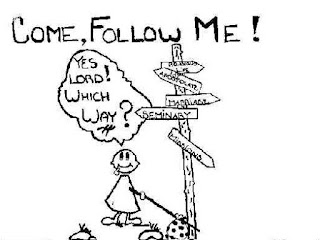Seeing how God works through the minority
Luke 3:15-16, 21-22
The people were filled with expectation, and all were asking
in their hearts whether John might be the Christ. John answered them all,
saying, “I am baptizing you with water, but one mightier than I is coming. I am
not worthy to loosen the thongs of his sandals. He will baptize you with the
Holy Spirit and fire.” After all the people had been baptized and Jesus also
had been baptized and was praying, heaven was opened and the Holy Spirit
descended upon him in bodily form like a dove.
And a voice came from heaven, “You are my beloved Son; with you I am
well pleased.”
As a
Christian, do you ever feel a little out of step with the world around you?
That is, when everyone else goes “zig” do you tend to go “zag”? Archbishop
Fulton Sheen captured this concept by saying, “God always works through the
minority, never through the majority.” You might almost say that God prefers
“the minority report” rather than “the majority report.” Recently, I conducted
an informal survey of when people took down their Christmas decorations. Do you
know what day the majority of people took down their trees and tinsel? It was
December 26. Does that seem a little odd to you? Well, it should! Why? Well
because Christmas – that special season in the church calendar – only begins on
December 25, and that season doesn’t end until today, the Baptism of the Lord.
So, I want you all to run home right now, put your trees back up, and don’t
take them down until tomorrow, AFTER Christmas is over! But do you see what’s
happening? The majority of people get it wrong, but the minority of the people
get it right. God always goes with the minority report.
In the
gospel today, we see a similar phenomenon unfolding. The majority of the people
are excited about John the Baptist, and they “all were asking in their hearts
whether John might be the Christ.” That was the majority report. But John
answered, “I baptize you with water, but one mightier than I is coming. He will
baptize you with the Holy Spirit and with fire.” That was the minority
report. Why? Well, because only John recognized Jesus.
Which one was right? Surprisingly, it’s the minority, not the majority. You
see, time and time again, when it comes to seeing how God works, when it comes
to sensing spiritual matters, the majority misses the mark, while the minority
is spot on. Only the minority recognized the Son, the one in whom the Father
was “well pleased.”
Have you
made your New Year’s Resolution yet? If you haven’t, don’t worry, you’re still
in the majority of people who haven’t done that yet either! The majority of
people procrastinate! But this year, instead of going after the usual suspects,
the usual resolutions like “losing weight” or “exercising more” – which the
majority of people will try to do – try to be more aware of the minority
report. When you see the majority of the people go “zig,” then you should try
to go “zag.” Let me give you some examples.
When you see
someone sitting alone and ignored by others – at work, or in school, or even at
church – then go and spend time with them. That’s the minority report, that’s
where God works and something spiritual happens. When you see people consumed
with consumerism and spending money only on themselves, then go and spend money
on others, especially the poor. When the majority “zigs,” you should “zag.” In
helping the poor, you’ll see the minority report: something spiritual and the
hand of God. When all your friends go to the movies and see Star Wars, but you
decide to go to the Adoration Chapel to see Jesus, the real Star of the real
Wars. In church, you’ll find the minority report, the spiritual and the divine.
When everyone else wants to be the president or a pop star, but you think about
being a priest, you’re thinking about the minority report. When most of the
culture is chasing sex, drugs and rock and roll, but you’re chasing chastity,
poverty and obedience, you’re really chasing the minority report; you’re chasing
God and his grace. Archbishop Fulton Sheen said, “God always works through the
minority, never through the majority.”
One day, a
smart and ambitious young man named Richard Rich approached St. Thomas More for
advice about what career to pursue. Richard really wanted to go into law and
politics; he wanted to be popular and prestigious. But St. Thomas said, “Why
not be a teacher? You’d be a fine teacher – maybe even a great one.” Richard
asked sourly, “And if I was, well, who’d know about it?” More answered, “You,
your pupils, your friends, God – not a bad public, that.” Not a bad public,
that. You see, Richard wanted the majority report, but More recommended the
minority report. Which career do you think that Richard finally settled on?
I’ll give you a hint: Richard would have taken down his Christmas lights on
December 26th, too.
Praised be
Jesus Christ!
















